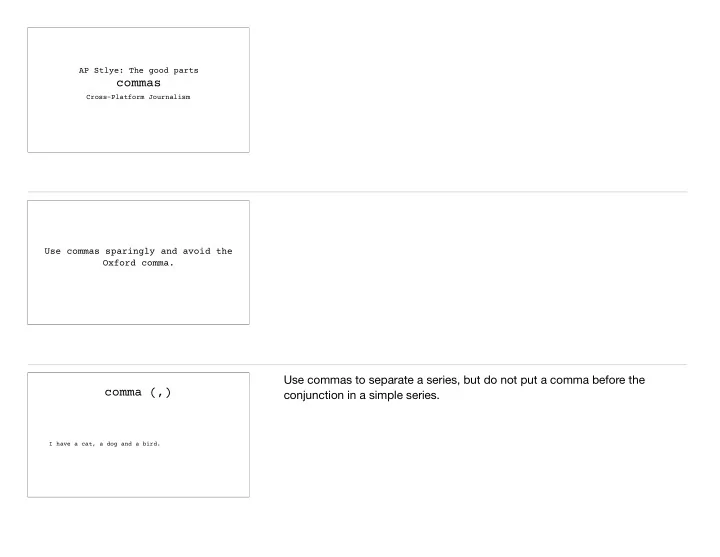

AP Stlye: The good parts commas Cross-Platform Journalism Use commas sparingly and avoid the Oxford comma. Use commas to separate a series, but do not put a comma before the comma (,) conjunction in a simple series. • I have a cat, a dog and a bird.
Put a concluding comma in a series, however, if an integral element of the comma (,) series requires a conjunction: I had orange juice, toast, and ham and eggs for breakfast. • Investigators believed the crime was committed by Ray Romano and Michael Keaton, Tina Fey, or Carson Daly. Use a comma also before the concluding conjunction in a complex series of comma (,) phrases. • The main points to consider are whether the athletes are skillful enough to compete, whether they have the stamina to endure the training, and whether they have the proper mental attitude. But while that’s a stylebook example, maybe you should just do this. comma (,) Remember, simplicity is better than complexity. • The main points to consider are whether the athletes have the necessary stamina, skills and attitude.
When a conjunction such as and, but or for links two clauses that could comma (,) stand alone as separate sentences, use a comma before before the conjunction in most cases. • The prosecutor met with police at Pizza Ranch, and then he drove to Keokuk. As a rule of thumb, use a comma if the subject of each clause is expressly comma (,) stated. • The prosecutor met with police at Pizza Ranch and then drove to Keokuk. Use a comma instead of a period at the end of a quote that is followed by by comma (,) attribution. Do not use a comma, however, if the quoted statement ends with a question • “Donald Trump is shallow. Has no understanding of mark or exclamation point. policy. He’s full of bluster but has no substance,” Jindal said.
Do not use a comma at the start of an indirect or partial quotation. comma (,) Use a comma instead of a period at the end of a quote that is followed by by attribution. • “Without seeing a murder weapon how can you convict? How?” defense attorney Maya Klient-Didit asked. Do not use a comma, however, if the quoted statement ends with a question mark or exclamation point. Do not use a comma at the start of an indirect or partial quotation. comma (,) Use a comma instead of a period at the end of a quote that is followed by by attribution. • Klient-Didit called the case “a non-serious carnival act.” Do not use a comma, however, if the quoted statement ends with a question mark or exclamation point.
Recommend
More recommend